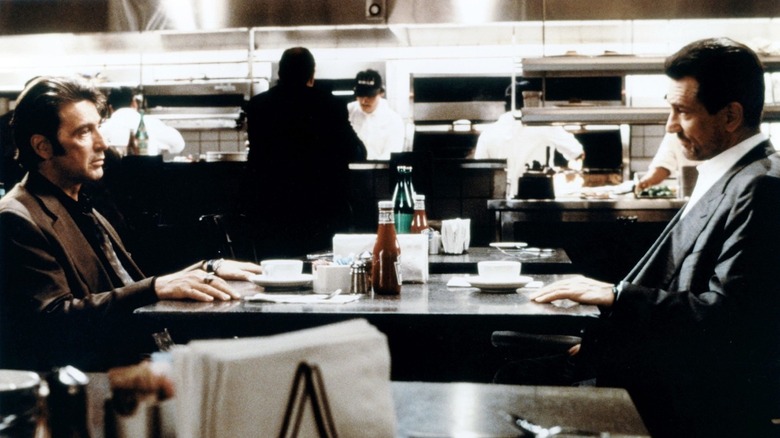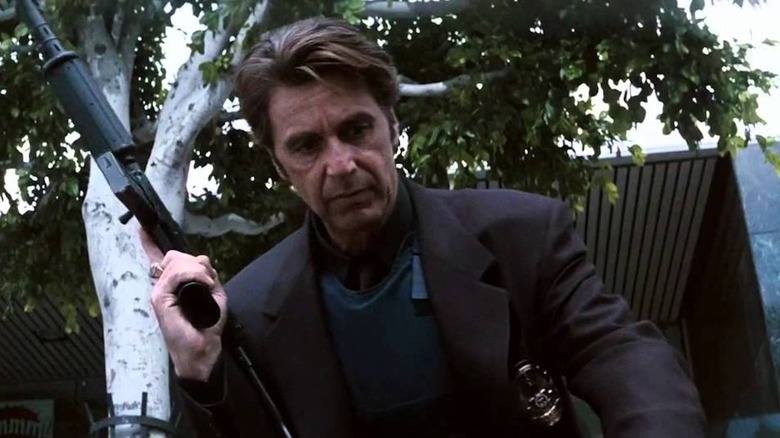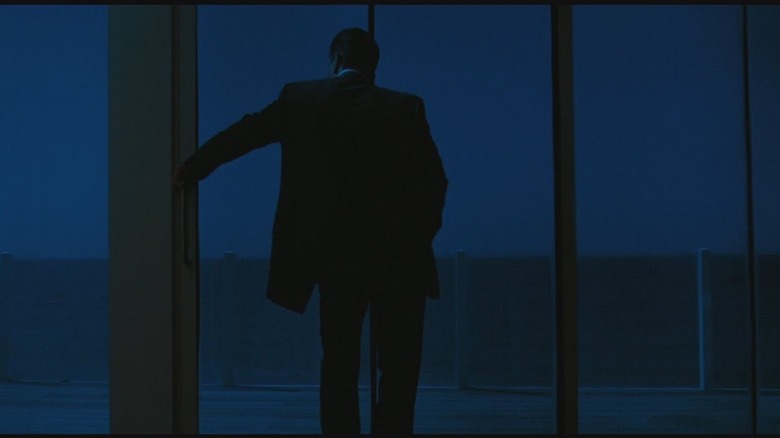Why Michael Mann Doesn't Consider Heat A 'Crime Movie'
If you consider Michael Mann's "Heat" to be one of the greatest crime films ever made, you are wrong. Care to disagree? Take it up with Mann.
In a 2018 interview with Empire, the esteemed auteur of such crime classics as "Thief," "Manhunter," and "Miami Vice" bristled at the notion that his 1995 masterpiece could be categorized so blithely:
"To me, 'Heat' was always a highly structured, realistic, symphonic drama. I never thought of it as doing a genre piece."
This might sound like a load of self-aggrandizing hooey, but if you dig into the origins of "Heat," which began its production life as a failed TV pilot for NBC, you'll find that Mann always envisioned the project as an existential inquiry into the rhyming lives of cops and criminals. LAPD Detective Vincent Hanna (Al Pacino) and cool-as-Miles-Davis bank robber Neil McCauley (Robert De Niro) are two sides of the same coin. They're archetypes, but they're also based on real people. You might be thinking that no amount of window dressing can mask the film's genre formula, but let's humor Mann. He's kinda earned it.
There are two sides to that coin
Michael Mann got the idea for "Heat" from Chicago cop Chuck Adamson, whose pursuit of professional thief Neil McCauley took a stranger-than-fiction turn when he bumped into his prey on the street. The story goes that Adamson didn't know whether to arrest McCauley or post up with him at a local diner for a cup of coffee. Life is funny like that, but the outcome wasn't much of a laugher: Some time later, Adamson shot McCauley dead during a botched robbery.
"Heat" is a romanticized expansion of the story. Mann maintains that the narrative exists outside of the crime genre because of its "character-driven dialectic." He views the film in musical terms, as he described to IndieWire:
"Its plot is driven by a crime story and a police story to a certain point, and then it breaks into a kind of chorus. In that chorus, we see slices of these different people's lives."
Basically, Mann has composed a twisted oratorio vaunting the holy craft of policing and heisting. His protagonists have answered a calling; Hanna could only ever be a detective, while McCauley's purpose on this planet was the orchestration and execution of a perfect robbery.
This is why "Heat" is Mann's second-best film, and it will likely remain so. Life isn't ordered or moral; you survive by a strict adherence to your code. McCauley falters by delaying his 30-second-flat departure to murder the psychopath Waingro (Kevin Gage), and holding on too tight to Eady (Amy Brenneman). Hanna compartmentalizes. He rescues his girlfriend's daughter, but he does not lose the scent. He stays sharp ... on the edge ... where he's gotta be.
Brother, you are going down
Ambition is also a factor. Hanna's grasp does not exceed his reach. All he's got to do is bring McCauley in. It's a clean, clear assignment. McCauley, however, is shooting the moon. He's attempting to pull off that ill-fated last big score. Under the right conditions, chased by a lesser opponent, McCauley could easily disappear. But he drew the Ali to his Foreman. He abandons his code, he loses his focus, and he is knocked out.
"Heat" charts the classic rise-and-fall trajectory of every gangster movie dating back to Howard Hawks' "Scarface." It's obviously about crime because it's about trying to get one over in America. But you bought your ticket knowing Hanna would eventually put McCauley down. This is why "The Insider" is Mann's true-crime masterpiece. You walked in believing you'd see corruption exposed and the American way upheld; instead, you bore witness to the death of the fourth estate. And that's the thing: You can't make an honest movie about an American institution that isn't a crime movie. And that's all Mann's done throughout his career.


